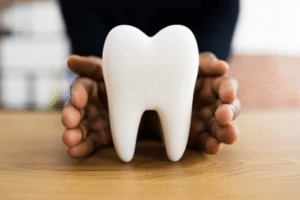Understanding the Connection: Oral Health and Overall Well-being
 When we talk about health, we often think about eating well, exercising, and visiting the doctor regularly. While these factors are undoubtedly important, one aspect that often gets overlooked is oral health. Surprisingly, your oral health plays a significant role in your overall well-being. In this comprehensive guide, we will explore the vital link between the two. From understanding the impact of oral health on general health to the importance of dental check-ups, we will cover it all. So, let's dive in and learn more about why oral health matters for your entire body!
When we talk about health, we often think about eating well, exercising, and visiting the doctor regularly. While these factors are undoubtedly important, one aspect that often gets overlooked is oral health. Surprisingly, your oral health plays a significant role in your overall well-being. In this comprehensive guide, we will explore the vital link between the two. From understanding the impact of oral health on general health to the importance of dental check-ups, we will cover it all. So, let's dive in and learn more about why oral health matters for your entire body!
Why Your Oral Health Matters for Your General Health
- The Mouth-Body Connection: Your mouth is not just a gateway to eating and speaking; it's also a gateway to the rest of your body. The health of your teeth, gums, and oral tissues can directly influence the health of other body systems. When your mouth is healthy, it can help protect you from various health issues. On the other hand, poor oral health can negatively affect your overall well-being.
- The Impact of Gum Disease: Gum disease, also known as periodontitis, is a severe oral health condition that affects the gums and supporting structures of the teeth. When left untreated, gum disease can lead to inflammation and infection. This chronic inflammation can have ripple effects throughout the body, contributing to systemic health problems.
- The Journey of Bacteria: Your mouth is a bustling ecosystem of good and bad bacteria. When you have good oral hygiene practices, the harmful bacteria are kept in check, and your mouth remains healthy. However, if you neglect your oral health, harmful bacteria can multiply and enter the bloodstream, potentially causing infections and inflammation in other parts of the body.
The Crucial Connection: Oral Health and Overall Wellbeing
- Cardiovascular Health: Research has shown a strong connection between gum disease and
 heart disease. The bacteria from infected gums can enter the bloodstream and attach to the blood vessels, forming plaques. Over time, these plaques can narrow and block blood flow, potentially increasing the risk of heart attacks and strokes.
heart disease. The bacteria from infected gums can enter the bloodstream and attach to the blood vessels, forming plaques. Over time, these plaques can narrow and block blood flow, potentially increasing the risk of heart attacks and strokes. - Diabetes and Oral Health: If you have diabetes, you need to pay extra attention to your oral health. Individuals with diabetes are more susceptible to gum disease. Additionally, untreated gum disease can make it challenging to control blood sugar levels, making diabetes management more difficult.
- Respiratory Health: Your oral health can also affect your respiratory system. Poor oral health, especially gum disease, has been associated with an increased risk of respiratory infections such as pneumonia. When you have gum disease, the bacteria in your mouth can be inhaled into the lungs, potentially leading to lung infections.
- Pregnancy Complications: For expectant mothers, oral health is especially crucial. Pregnant women with gum disease may be at higher risk for preterm birth and low birth weight. The inflammation and bacteria from gum disease can affect the developing fetus.
The Role of Dental Check-ups in Protecting Your Health
Regular dental check-ups are more than just an opportunity to get your teeth cleaned. They play a crucial role in maintaining your oral health and overall well-being. Here's why dental check-ups are essential:
- Early Detection and Prevention: Dental check-ups allow your dentist to identify early signs of oral health issues such as cavities and gum disease. Early intervention can prevent these problems from worsening and causing further damage.
- Thorough Cleaning: Despite your best efforts, plaque and tartar can still build up in hard-to-reach areas of your mouth. Dental professionals have the expertise and tools to thoroughly clean your teeth and gums, reducing the risk of gum disease and tooth decay.
- Oral Cancer Screening: Dental check-ups include oral cancer screenings, which can help detect potential issues in their early stages. Early detection significantly improves the chances of successful treatment and better outcomes.
- Personalized Oral Care Advice: Dentists can provide tailored advice on oral hygiene techniques, diet, and lifestyle choices that can positively impact your oral health. They can address specific concerns you may have and offer practical solutions.
Easy-to-Implement Tips for Optimal Oral Health
Maintaining good oral health is essential for your overall well-being. Here are some easy-to-understand tips to help you achieve optimal oral health:

- Use Mouthwash: Incorporate mouthwash into your daily oral hygiene routine. Mouthwash can help reduce the amount of bacteria in your mouth, freshen your breath, and reach areas that brushing and flossing might miss. Choose an alcohol-free mouthwash for a gentler experience.
- Don't Forget Your Tongue: Your tongue can harbor bacteria and contribute to bad breath. Remember to gently brush your tongue or use a tongue scraper to remove any buildup and maintain a clean oral environment.
- Chew Sugarless Gum: Chewing sugarless gum, especially after meals, can stimulate saliva production, which helps neutralize acids and wash away food particles. Look for gum with xylitol, a natural sweetener that also has some antibacterial properties.
- Replace Your Toothbrush Regularly: Toothbrushes wear out over time, and old bristles can harbor bacteria. Replace your toothbrush every three to four months, or sooner if the bristles become frayed. Additionally, replace your toothbrush to prevent reinfection after recovering from an illness.
- Protect Your Teeth During Physical Activities: If you participate in sports or other physical activities, consider wearing a mouthguard to protect your teeth from injury. Mouthguards can help prevent chipped teeth, tooth loss, and injuries to the mouth's soft tissues.
- Avoid Grinding Your Teeth: Teeth grinding, also known as bruxism, can lead to enamel wear, tooth sensitivity, and jaw pain. If you suspect that you grind your teeth, speak with your dentist about getting a custom-fitted night guard to protect your teeth while you sleep.
- Visit the Dentist at the First Sign of Trouble: Don't ignore any signs of oral health issues such as tooth sensitivity, bleeding gums, or persistent bad breath. Please schedule an appointment with your dentist at the first sign of trouble to address the problem early and prevent it from becoming more serious.
- Promote Oral Health in Children: Encourage good oral hygiene habits in children from an early age. Teach them to brush their teeth properly and make dental visits a positive and routine part of their healthcare.
- Manage Stress: Chronic stress can contribute to teeth grinding and other oral health issues. Practice stress-reduction techniques such as meditation, yoga, or spending time on hobbies to promote better oral health and overall well-being.
- Consider Dental Sealants: Dental sealants are thin, protective coatings applied to the chewing surfaces of molars and premolars. They can help prevent cavities in these vulnerable areas, especially in children and teenagers.
Conclusion
Your oral health is intimately connected to your overall well-being. Understanding the vital link between oral health and general health is crucial for leading a healthy life. By prioritizing regular dental check-ups, practicing good oral hygiene, and making positive lifestyle choices, you can take significant steps toward improving your oral and overall health. Remember, a healthy smile goes hand in hand with a healthy body, so take care of your oral health and enjoy the benefits of a happier, healthier life! Contact us today!
Ready to find out more?
Contact us for more information!
